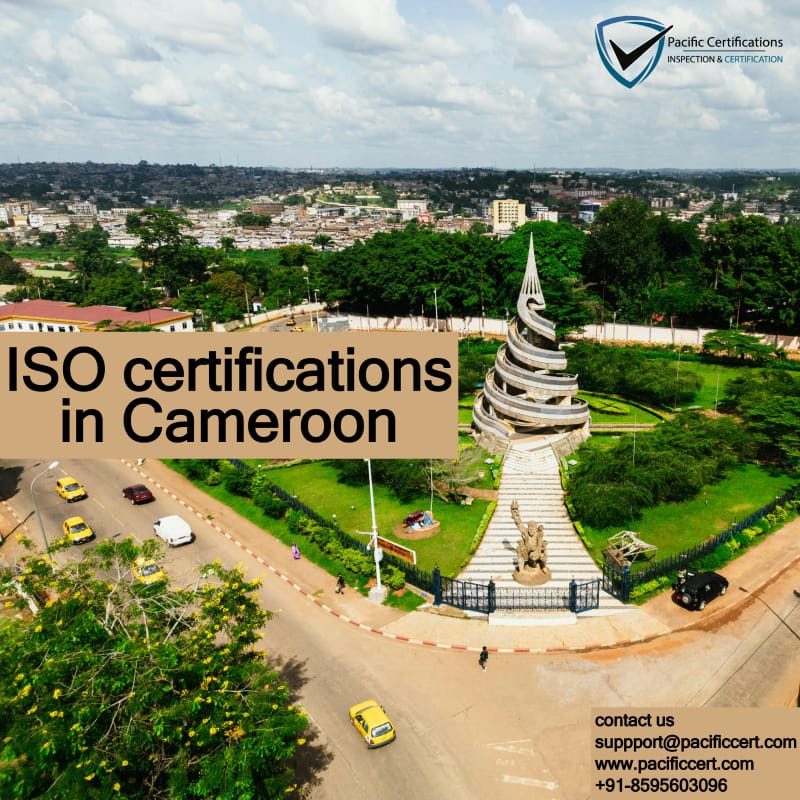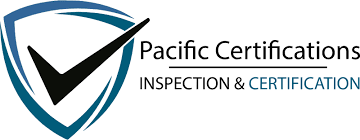ISO Certifications in Cameroon, Popular Standards, Requirements and Benefits

Quick Summary
"ISO certifications are becoming increasingly important in Cameroon as companies strive to enhance quality, safety, and competitiveness both locally and globally. Widely applicable standards include ISO 9001:2015 (Quality Management), ISO 14001:2015 (Environmental Management), ISO 45001:2018 (Occupational Health & Safety), and ISO 27001:2013 (Information Security Management). Pacific Certifications offers expert guidance and audit services throughout this journey. The benefits for Cameroonian organizations include improved operational efficiency, regulatory compliance, better risk management, enhanced customer satisfaction, and access to new markets. Across sectors—manufacturing, agriculture, healthcare, IT, construction, energy, education, hospitality, logistics, and finance—ISO certification strengthens reputation and supports sustainable growth."
Introduction
ISO certifications represent a set of standards developed by the International Organization for Standardization (ISO) that help organizations ensure their products and services meet customer and regulatory requirements, and demonstrate continuous improvement.
These standards cover various aspects of business operations, including quality management, environmental management, information security, and occupational health and safety, among others.
In Cameroon, as in other countries, these certifications are vital for businesses aiming to improve their operational efficiency, enhance customer satisfaction, and gain a competitive edge in both local and international markets.
Key ISO Certifications and Applicable Standards
Several ISO certifications are particularly relevant for organizations operating in Cameroon, given the country's economic, environmental, and technological context:
ISO 9001:2015 (Quality Management Systems)
This is the most widely recognized standard for quality management systems worldwide. It helps organizations ensure they meet customer and other stakeholder needs within statutory and regulatory requirements related to a product or service.
ISO 14001:2015 (Environmental Management Systems)
Essential for organizations looking to manage their environmental responsibilities systematically, this standard helps businesses minimize their environmental footprint, comply with applicable laws, and work towards continual environmental improvement.
ISO 45001:2018 (Occupational Health and Safety Management Systems)
This standard provides a framework for managing health and safety risks and improving employee safety, reducing workplace risks, and creating better, safer working conditions.
ISO 27001:2013 (Information Security Management Systems)
With the increasing importance of information security, this standard helps organizations manage the security of assets such as financial information, intellectual property, employee details, and information entrusted by third parties.
Click here to find out more applicable standards to your industry
Requirements of ISO Certifications in Cameroon
ISO certification requirements in Cameroon, as in other countries, depend on the specific ISO standard being applied for. However, there are some general processes and requirements that organizations need to understand and follow to achieve ISO certification, regardless of the standard.
We at Pacific Certifications can guide organizations through the specific requirements of each standard, but here’s an overview of the general process and requirements for obtaining ISO certification:
General Requirements for ISO Certification
- Understanding the Standard: Before embarking on the certification process, an organization must fully understand the ISO standard's requirements. This involves obtaining a copy of the standard and possibly seeking training or consultancy services to interpret and implement the standard effectively.
- Gap Analysis: Conducting a gap analysis is a critical step to assess the current state of an organization's processes and systems against the requirements of the ISO standard. This helps identify areas that need improvement or changes to meet the standard’s requirements.
- Implementation: Based on the gap analysis, the organization needs to develop and implement processes, policies, and procedures to meet the standard’s requirements. This often involves a significant effort to ensure that all parts of the organization are operating in alignment with the standard.
- Documentation: Adequate documentation is crucial for ISO certification. This includes documenting the processes, policies, and procedures implemented, as well as keeping records of operational activities, training, audits, and management reviews that demonstrate compliance with the standard.
- Employee Training and Engagement: Employees at all levels should be trained and made aware of the requirements of the ISO standard, their role in the certification process, and the importance of compliance. Engagement across the organization is critical for successful implementation and maintenance of the system.
- Internal Audits: Conducting internal audits is required to assess the effectiveness of the implemented system and identify areas for improvement. Internal audits help prepare the organization for the external certification audit.
- Management Review: Senior management should review the performance of the implemented system against the standard’s requirements. This review is crucial for ensuring ongoing commitment and identifying opportunities for continual improvement.
- Certification Audit: The certification audit is conducted by an external certification body, such as Pacific Certifications. It consists of two stages: Stage 1 (documentation review) and Stage 2 (main audit) where the auditor verifies that the organization's management system complies with the standard’s requirements.
- Corrective Actions: If the auditor identifies non-conformities, the organization must address these by taking corrective actions and possibly undergoing a follow-up audit.
- Certification: Once the organization successfully passes the certification audit and any non-conformities have been addressed, the certification body will issue the ISO certification, indicating compliance with the standard.
- Surveillance Audits: To maintain certification, the organization will undergo periodic surveillance audits, usually annually, to ensure continued compliance with the standard.
- Recertification: ISO certifications are typically valid for three years, after which the organization must undergo a recertification audit to renew their certification.
How Pacific Certifications Can Assist?
We at Pacific Certifications can assist organizations in Cameroon by providing expert guidance through each step of the process, preparation for the certification audit. We can also conduct the certification audit and issue the ISO certification upon successful completion.
Additionally, We offer training and continuous support to ensure organizations not only achieve but maintain and improve their ISO certification status, ensuring ongoing compliance and performance improvement.
Benefits of ISO Certifications in Cameroon
ISO certifications bring a multitude of benefits to organizations in Cameroon, spanning across various industries, from manufacturing and services to IT and healthcare. By adhering to internationally recognized standards, companies can enhance their operational, environmental, and safety performances, among other aspects. Here’s a detailed look at the key benefits of obtaining ISO certifications for businesses operating in Cameroon:
Enhanced Operational Efficiency
- Process Improvement: ISO standards require organizations to analyze and optimize their processes. This leads to more efficient use of resources, reduction of waste, and improvement in productivity.
- Quality Management: ISO 9001, in particular, focuses on quality management systems, helping businesses improve their product and service quality consistently, leading to higher customer satisfaction.
Access to New Markets
- International Recognition: ISO certifications are recognized globally. Having an ISO certification can open doors to new markets, especially for exports, as it assures international buyers of the quality and reliability of products and services.
- Competitive Advantage: In competitive tenders, especially where international players are involved, having ISO certifications can give businesses an edge over competitors who are not certified.
Legal and Regulatory Compliance
- Understanding Legal Requirements: ISO standards often encompass current laws and regulations within their frameworks. This helps organizations ensure they are aware of and comply with relevant legal and regulatory requirements, reducing the risk of fines or legal issues.
- Environmental Responsibility: ISO 14001 focuses on environmental management systems, helping companies minimize their environmental impact, comply with applicable laws and regulations, and achieve continual improvement of environmental performance.
Improved Risk Management
- Proactive Risk Assessment: Many ISO standards require organizations to conduct risk assessments and take preventive measures, enhancing their ability to identify and manage potential risks effectively.
- Information Security: ISO 27001 is specifically designed to manage and protect information assets, reducing the risk of data breaches, which is increasingly important in the digital age.
Enhanced Customer Satisfaction
- Customer Confidence: Certifications demonstrate a commitment to quality, safety, and reliability, which can increase customer trust and satisfaction.
- Feedback Mechanism: ISO standards encourage feedback from customers, which can be used to continually improve products and services.
Employee Morale and Engagement
- Clear Roles and Responsibilities: Implementing ISO standards helps clarify roles and responsibilities within the organization, improving employee morale and job satisfaction.
- Safety and Well-being: Standards like ISO 45001 focus on occupational health and safety, contributing to a safer workplace and promoting the well-being of employees.
Sustainability and Corporate Responsibility
- Sustainable Practices: ISO certifications, especially those related to environmental management and social responsibility, help organizations adopt sustainable practices, contributing to corporate social responsibility goals.
- Energy Efficiency: Certain standards provide frameworks for improving energy efficiency and reducing greenhouse gas emissions, aligning with global efforts to combat climate change.
Financial Performance
- Cost Savings: Improved efficiency and productivity, along with reduced waste and incidents, can lead to significant cost savings.
- Market Expansion: Access to new markets and increased customer trust can lead to higher revenues.
For organizations in Cameroon, the journey to ISO certification, guided by the expertise of entities like us, Pacific Certifications, not only aligns them with global best practices but also significantly boosts their marketability and sustainability in the long term.
It's an investment that goes beyond compliance, embedding quality, safety, and efficiency into the DNA of the organization, and paving the way for continued success and growth.
Which industries need ISO Certifications in Cameroon?
ISO certifications are versatile and beneficial across a broad spectrum of industries in Cameroon, reflecting their universal appeal and adaptability to various business models and sectors.
These certifications are not limited to specific industries but are applicable wherever there is a need to improve quality, efficiency, environmental performance, information security, and employee health and safety. Here’s a look at some key industries in Cameroon that stand to benefit significantly from ISO certifications:
Manufacturing
- Quality Management (ISO 9001): Essential for enhancing production processes, ensuring quality control, and increasing customer satisfaction.
- Environmental Management (ISO 14001): Helps in reducing environmental impact and ensuring compliance with environmental regulations, which is crucial for manufacturing plants.
Agriculture and Food Processing
- Food Safety Management (ISO 22000, HACCP): Critical for ensuring the safety and quality of food products, from farm to fork, enhancing consumer trust and compliance with global food safety regulations.
Healthcare
- Quality Management (ISO 9001): Improves the quality of healthcare services, enhancing patient satisfaction and safety.
- Information Security (ISO 27001): Protects sensitive patient data, ensuring privacy and compliance with regulations.
Information Technology and Services
- Information Security Management (ISO 27001): Ensures the security of digital information, crucial for IT companies dealing with sensitive data.
- Service Management (ISO 20000): Helps IT service providers improve their service delivery, aligning with best practice and enhancing customer satisfaction.
Construction and Engineering
- Quality Management (ISO 9001): Ensures that construction projects meet both customer requirements and regulatory standards, improving overall project execution.
- Environmental Management (ISO 14001): Important for minimizing the environmental footprint of construction activities and promoting sustainable practices.
Energy and Utilities
- Environmental Management (ISO 14001): Helps manage environmental aspects, comply with legal requirements, and improve environmental performance.
- Energy Management (ISO 50001): Supports organizations in using energy more efficiently, crucial for energy-intensive industries.
Education
- Quality Management (ISO 9001): Enhances the quality of education and administrative services, ensuring continual improvement and student satisfaction.
Tourism and Hospitality
- Quality Management (ISO 9001): Improves service quality, customer satisfaction, and operational efficiency in hospitality services, including hotels and restaurants.
Logistics and Transportation
- Quality Management (ISO 9001): Enhances efficiency in logistics operations, improves customer satisfaction, and ensures quality in the supply chain.
Financial Services
- Information Security (ISO 27001): Essential for protecting financial data, ensuring data privacy, and compliance with financial regulations.
Conclusion
For businesses in these and other industries in Cameroon, obtaining ISO certifications can provide a competitive edge, enhance operational efficiencies, and open doors to global markets. Moreover, the process of achieving and maintaining ISO certification, with the guidance of organizations like Pacific Certifications, encourages continuous improvement and innovation, driving long-term success and sustainability.
Pacific Certifications is accredited by ABIS, in case you need support with ISO certification for your business in Cameroon, please contact us at [email protected] or +91-8595603096.
Ready to get ISO certified?
Contact Pacific Certifications to begin your certification journey today!
Suggested Certifications –
Read more: Pacific Blogs

